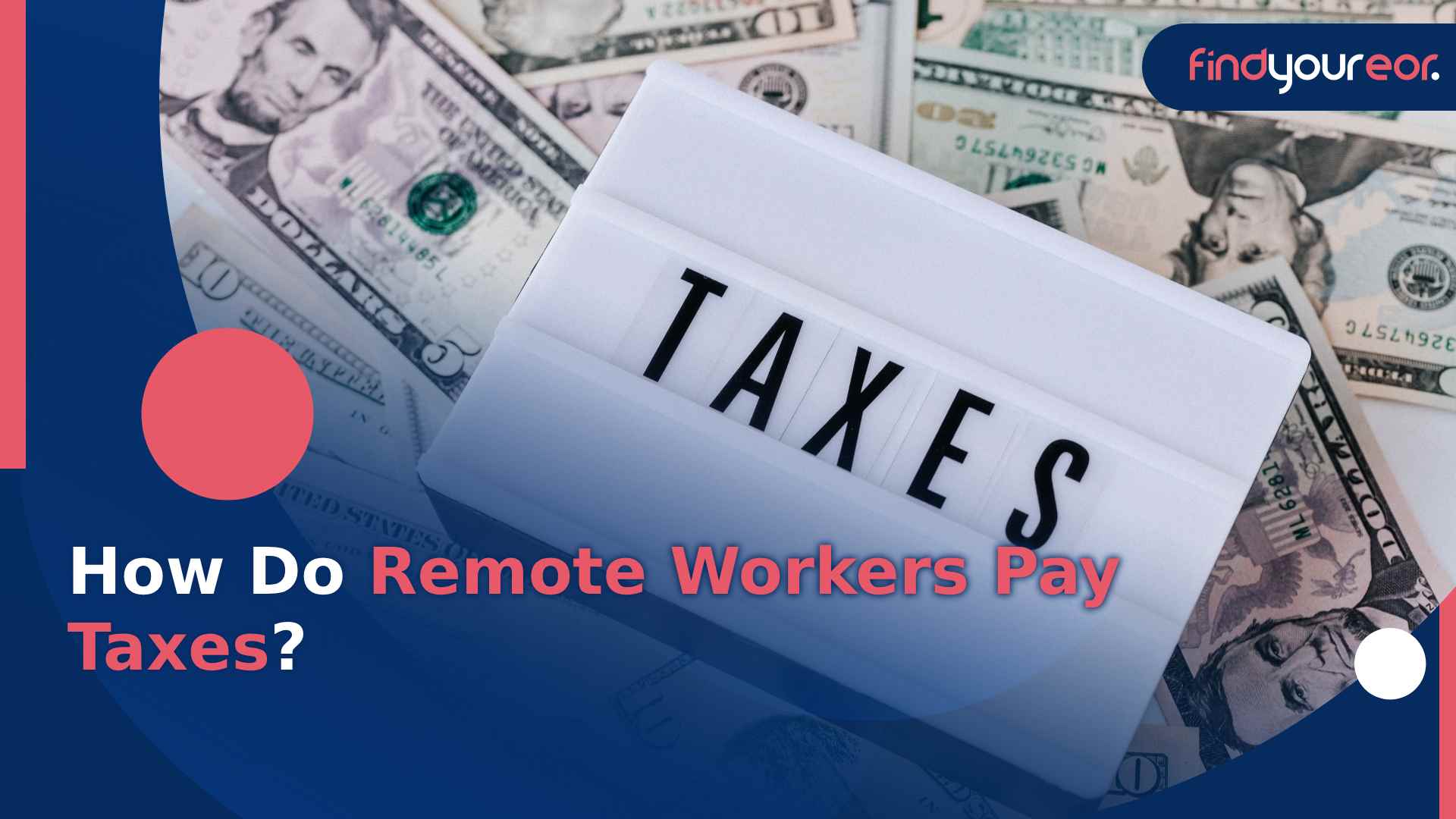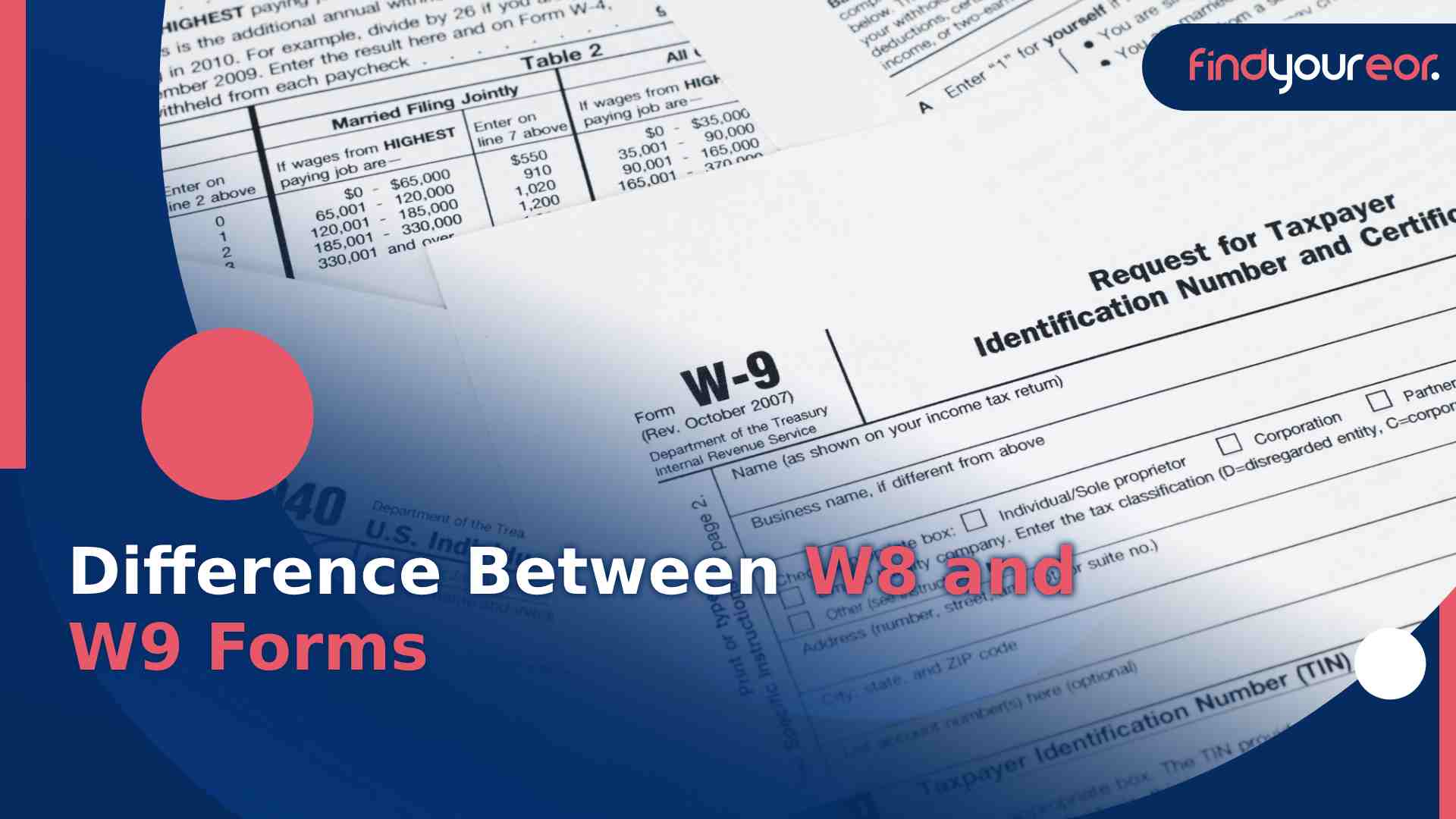How Do Remote Workers Pay Taxes?
Last update: July 11th 2023
Taxes, no one really wants to talk, read, or even hear about it at first. Yes, everyone is aware of them and should abide by them, but it definitely is not one's favorite topic. However, everyone must put up with it. This is especially crucial for digital nomads, who must be aware in order to completely comply. Consequently, learning about remote work taxes is crucial for this type of workers.
In this article, we will be giving you an explanation about remote work taxes. Understanding the tax regulations can be difficult if you have remote workers in jurisdictions other than the one where your business is currently. This article can help you stay lawful no matter where your HQ is if you operate remotely or if you have workers who do.
Understanding remote work tax obligations
Employees that work remotely can do so from any location. However, this liberty comes with obligations, just like other benefits. Even while remote work taxes are typically not more complex than those for office workers, the majority of tax education resources are geared toward those who operate in conventional settings.
There is less ambiguity to negotiate in a conventional in-person job setting where the staff is living and working in the exact same region as your business. You only pay the necessary payroll taxes and withhold local income taxes, if any are due in your region.
For instance, if an employee works from home for your Australian company but resides in UAE, you must deduct UAE local and state income taxes from their wages and other benefits. You will also be responsible for paying all local taxes, including any applicable unemployment taxes.
In conclusion, distant workers must submit taxes in the nation where they are legally resident. The primary residence or customary place of abode is what is meant by this. Since they are actually stationed in different nations during the financial year, digital nomads may have to deal with a few more layers, including possible local taxation.
Remember that working remotely from another nation for an extended period of time involves planning and, most likely, a visa, either it is a shorter visa or a work visa. These experts may occasionally be able to apply for a virtual nomad visa, which is a particular type of work visa.
Navigating taxation challenges for digital nomads
As a remote worker, you might conduct your business from your residence in the same area as your employer has its headquarters, or you may work and live in a whole different nation.
No matter where you are, the ability to complete your business online may result in tax complications. Remote worker taxes are intricate and frequently difficult to manage. However, with the correct information and preparation, you may avoid unneeded problems and financial liabilities.
A norm for global taxation is that the worker receives taxes in the nation from where they do their job. Not in the nation where their employer's place of business exists. In other words, an overseas worker's tax duty is dependent on the nation in which they are a tax resident. This status relates to the location where a person spends the most of their time physically, or more commonly, the place they call home. The lone exception to this universal rule of thumb is to US residents. Because, they will simultaneously owe taxes to both their nation of citizenship and their nation of tax domicile.
To avoid double taxes and to explain the regulations regarding tax residency, governments frequently have bilateral tax agreements in place. To ensure that only one nation can tax you, it is vital to ascertain which nation you have ties to.
When hiring remote workers, organizations almost universally outsource these additional complexities and instead use an Employer of Record. Which, is a business that hires people on behalf of other businesses while ensuring that local tax and employment rules are followed.
Last but not least, some businesses would only permit remote workers to relocate within the same country or state provided they operate as independent contractors. These contractors would then frequently need to register locally as self-employed.
Seeking professional advice for remote work taxation
According to your individual and professional circumstances, international taxation might be confusing and difficult. Because of this, it is wise to get expert guidance from a specialist tax consultant firm who focuses in cross-border taxation.
Your tax obligations can be clearer, your tax planning can be made more effective, your tax returns can be ready and filed, and any audits and disputes are easier to resolve with the assistance of an EOR. They are able to guide you on any modifications that may affect you. Plus, assist you in keeping up with the most recent tax legislation and rules in both countries.
An EOR can lessen tax obligations and simplify administrative duties for a business and its employees.
As part of the agreement, the EOR uses its legitimate local corporation to legitimately hire workers for of the hiring company. The country's payroll administration and tax filing are then handled by the EOR. The client is charged for the cost of taxes as part of the overall service fee.
By reducing the likelihood of labor audits, employee misclassification, establishment, and tax audits, the EOR hiring strategy successfully defends both the business and the individual. An EOR can:
· Reduce the tax footprint globally. A firm can lower its tax obligation in all countries but its own by adopting an EOR. As a result, administering personal and company taxes on behalf of employees takes up less time and money.
· Lessen the dangers of permanent implantation. Companies can form teams abroad without bothering about long-term residency by converting independent contractors into EOR employees.
· Ensure compliance. The EOR partner is in charge of upholding compliance with regional tax and labor legislation. The EOR can offer advice on a variety of topics, including compensation, immigration, and intellectual property.
Determining tax residency for remote workers
You must be aware of how and where your employees must pay their contributions and taxes. This, if you want to make sure that your business has a compliant payroll procedure.
Remote workers will have to start collecting tax and contributions to social security in the nation that they work in. This, once they have lived and worked "abroad" for a greater amount of time.
Use the Netherlands as an illustration. In the Netherlands, there is a limit of 183 days for employees who are tax filers. They can live abroad during this time while continuing to pay Dutch working remotely taxes. In the Netherlands, their earnings will still be withheld to cover their social security contributions. However, if they stay overseas for an additional six months or so, their tax working remotely residence will shift.
Expats are typically the people who reside and work outside of their place of citizenship. When it comes to taxes, your citizenship status typically has no bearing. Because fiscal residency is determined by where you really live.
However, your nation of citizenship may still require you to submit a tax return. This is known as citizenship-based taxes, and only a few nations, especially the United States, practice it. This implies that regardless of where they reside across the globe or whether they had any income in the US, US citizens must submit a tax return to the IRS.
Because most nations have specific tax regulations for expatriates or have tax treaties with other nations, you will typically be able to use a tax exemption or a credit for foreign taxes in the nation of citizenship for the income tax you have already incurred in your country of residency.
Taxation of remote workers in host country
During the global shutdown, policies for remote working have been introduced. Employers were forced to move their activities online while everyone was in a pandemic cocoon. They soon realized that while staff worked from the convenience of their homes, their companies could still run successfully.
Some people wonder, if I work remote where do I pay taxes, the answer is, you must pay taxes to the host country. Most nations have laws governing tax residency. These specify the amount of time you can spend there before you are considered a resident for tax purposes. If you stay for over six months straight in a year, you often need to register as a tax resident and collect income tax.
Contractors and part-time employees are also subject to tax residency regulations, particularly when it comes to filing taxes. For instance, foreign contractors in the US are required to submit a Form 1042 to the IRS. Think about a situation where a contractor from India goes to the United States for eight months to work remotely and then goes home to keep on working from his house office. The contractor would have to submit a Form 1042 with the IRS and disclose any income earned while working in the United States in order to make sure there was no tax evasion.
Factors influencing tax residency for remote workers
Below are a few tax factors that any business or remote worker needs to think about prior to making the switch. Remember that even though an employee's individual tax rate applies, the employer is still subject to a number of compliance obligations that incur significant administrative expenses.
· Jurisdiction: There are many factors to consider when determining which country's tax regulations will apply to an employee when they are in an alternate tax territory, such as a different country, state (in nations where state revenue tax is applicable, like the USA), or continuously moving around the world.
· 183-day rule: The 183-Day Guideline is the most inclusive rule. According to this rule, an employee will be a resident of a country for tax reasons if they spend over 183 days there in a single fiscal year. This implies that the worker will be responsible for paying taxes there.
· Tax withholding: Before sending the money as tax withholding or TDS (tax deduction at sources) to the tax authority, employers may necessitate to withhold a specific amount of income from the employee's income. The employee may be eligible for a reimbursement of such tax withholding by filing an application with a refund request. This, if they do not have to pay any taxes in their country of origin, which is the employer's country.
Reporting & compliance for remote workers
Consider using the following tactics to ensure that distant employee payroll tax requirements are met:
· To automatically compute payroll tax amounts, submit paperwork, and pay payroll taxes on time, every time, use payroll software.
· Once you are aware that there is a nexus, find out which accounts must be setup. This can apply to unemployment insurance accounts and state income tax withholding.
· To ensure that your staff is okay, update your employee's compensation coverage to reflect the state they are working in.
· Review and update your handbook for workers to add state-specific regulations that you did not need to include before.
· Make sure everyone is aware of the company's regulations regarding remote employment and payroll taxes by holding frequent training sessions.
· So that you never have to worry about skipping a step, hire an EOR to manage everything for you.
Companies employing remote teams must be aware of their obligations with regard to payroll tax compliance. Employers must make sure they are fulfilling all obligations for remote worker payroll taxes by automating operations, using expert services, and setting clear policies and procedures.
Taxation of remote workers in home country
Your tax residency frequently depends by where you live and work most of the time.
If you move while working, you often receive taxation in your destination country by default. To prevent double taxation, see if your stay is brief enough to be eligible for a waiver or if you may take use of a tax treaty.
Some people must pay taxes regardless of where they reside (this constitutes more of a special case than the rule). For instance, US citizens must annually file US tax returns and get US tax benefits.
Conclusion
Businesses can be confident that their overseas employee payroll taxes are properly in place by comprehending the duties for payroll tax compliance for companies with remote employees, applying tactics to ensure those obligations are met, and avoiding typical blunders in this area.
While remote work taxes can be difficult to comprehend, there are international HR solutions that can help to expedite the employment and tax processes abroad. One of these are the EORs and PEOs. These professionals can give you the support you need to cover your employees from tax penalties and fines.
All you have to do is find the ideal partner that can work according to your business needs. With their support, you can find out how does remote work get taxed and provide tax for remote workers!

















.jpg)




















